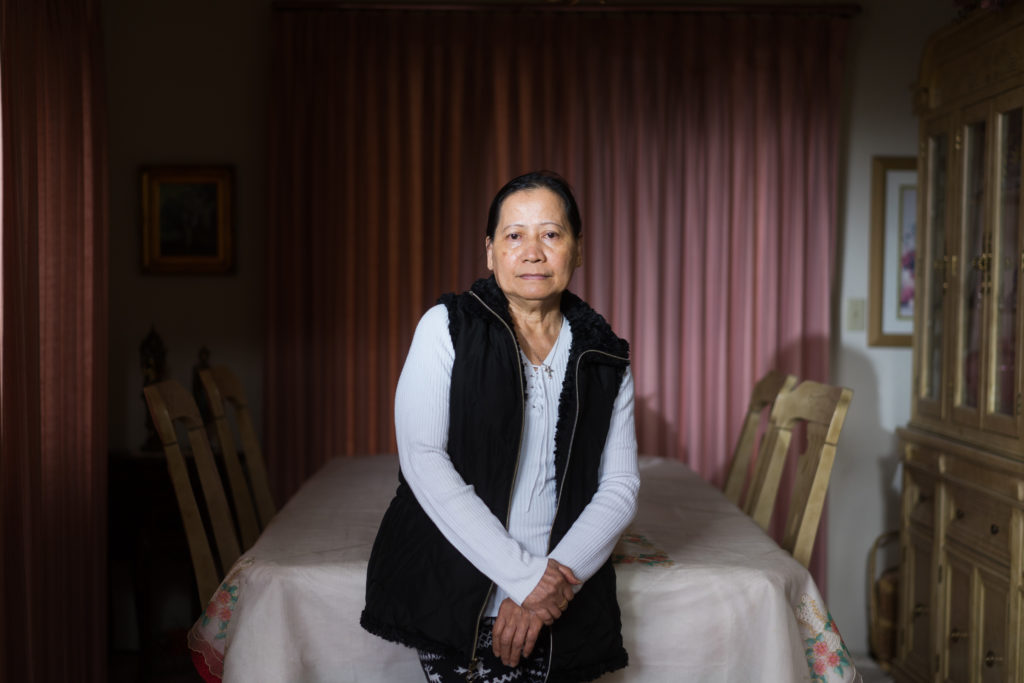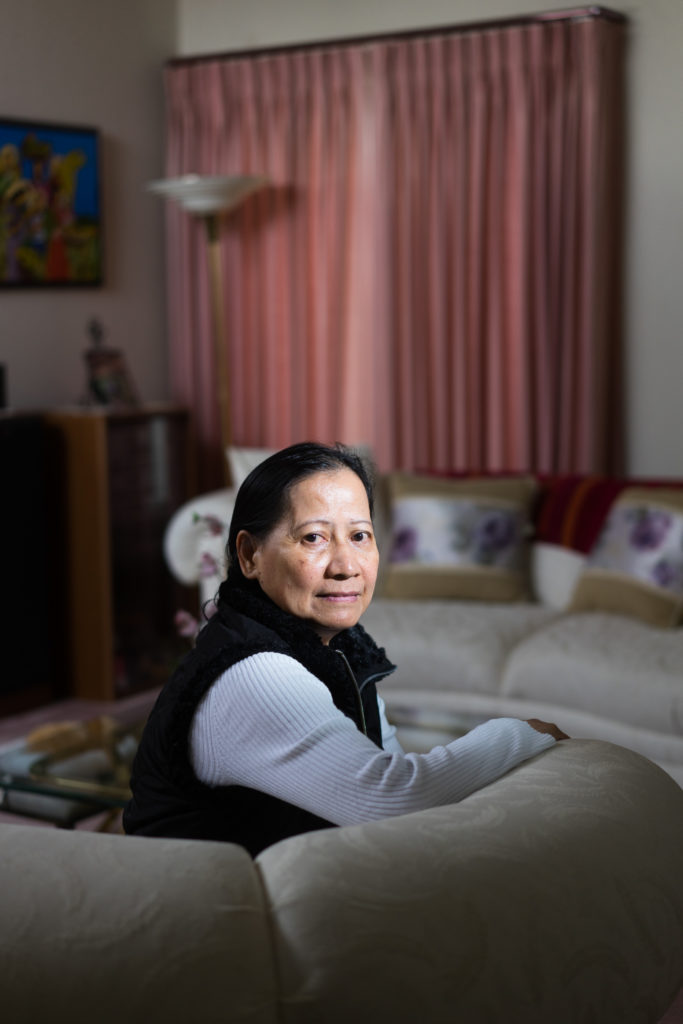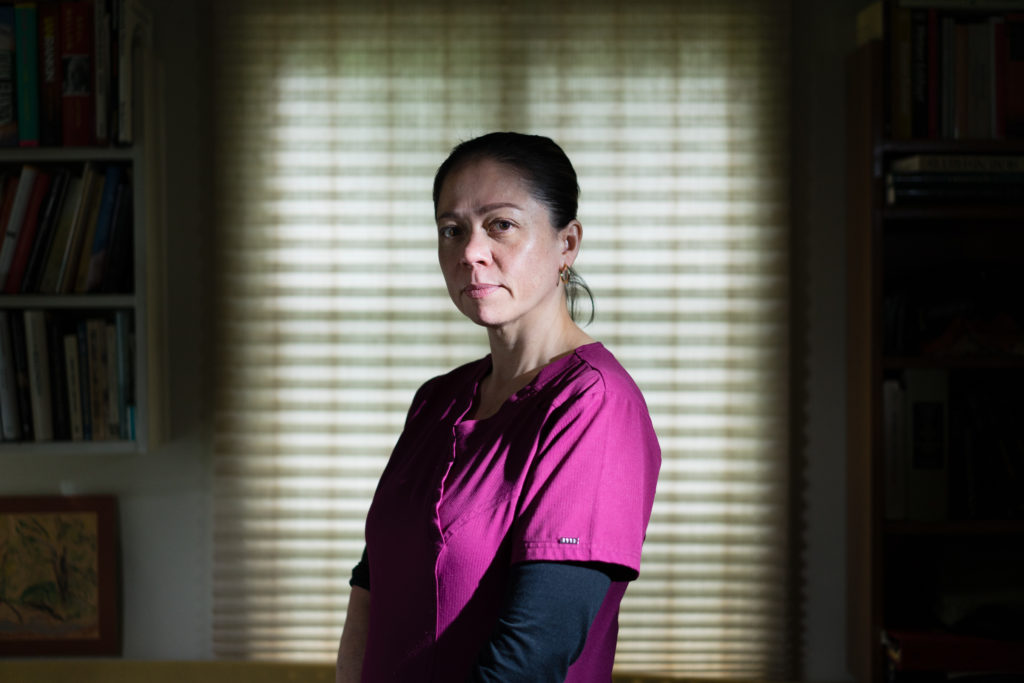By Jennifer Gollan, Reveal from the Center for Investigative Reporting
She alights from a black Ferrari convertible, her Christian Louboutin stilettos glinting in the sunlight. The lid of her black lacquer grand piano is propped open in the living room of her plush Beverly Hills home.
“I own a chain of elderly care facilities,” she says into the camera on Bravo’s reality television show “The Millionaire Matchmaker.” “My net worth is $3 to $4 million, probably.”
Stephanie Costa was 30 and enjoying a lifestyle supported in part by six board-and-care homes she owned in California’s Central Valley. But half of that fortune was threatened when she and her company initially were cited for about $1.6 million for labor violations, including wage theft – not paying 11 employees for working much of 24 hours a day, six days a week.
Costa, who declined to be interviewed for this story, is a rare public face of a burgeoning multibillion-dollar elder care industry that is enabling operators to become wealthy by treating workers as indentured servants. Across the country, legions of these caregivers earn a pittance to tend to the elderly in residential houses refurbished as care facilities, according to an investigation by Reveal from The Center for Investigative Reporting.
The profit margins can be huge and, for violators of labor laws, hinge on the widespread exploitation of thousands of caretakers, many of them poor immigrants effectively earning $2 to $3.50 an hour to work around the clock. The federal hourly minimum wage is $7.25.
Reveal interviewed more than 80 workers, care-home operators and government regulators and reviewed hundreds of wage theft cases handled by California and federal labor regulators, workers and local district attorneys. The investigation found rampant wage theft has pushed a vast majority of these caregivers into poverty.
Workers are left feeling desperate and trapped. Many caregivers say they rise before daybreak to cook meals, shower residents and scrub toilets. At night, they are deprived of sufficient sleep because they have to wake to change adult diapers, dispense painkillers, return wandering dementia residents to their beds and shift the bedridden every two hours to thwart bedsores.
Workers describe sleeping in hallways and garages, on couches and the floor. Some care homes deduct $25 a day from caregivers’ paychecks for “lodging.”
Exploited caregivers rarely are allowed a day off; even then, they often must pay their substitutes. Two caregivers recounted having miscarriages after their bosses refused to allow them time off or to stop lifting heavy residents.
Because these workers often live where they work, they are under the watchful eye of their bosses. They are bullied into not cooperating with investigators. In some cases, care-home operators have threatened to report undocumented workers to authorities.
Human trafficking – in which workers, particularly Filipinos, are coerced, manipulated and exploited – also is not uncommon, according to prosecutors and attorneys. For example, several family members were charged last year with human trafficking and labor abuse in a case involving caregivers in San Mateo County, California, south of San Francisco.
“It’s a classic tale of human greed,” said Tia Koonse, legal and policy research manager at the UCLA Labor Center. “Their entire business model is predicated on not making payroll. It relies on people being willing to work for 24 hours a day for less than a dollar an hour. Only trafficked people will put up with that.”
***
The growth of board-and-care homes in neighborhoods across the United States is tied to medical advances, enabling aging baby boomers to live longer despite debilitating illnesses. This has resulted in an increasing number of gravely ill people or their family members seeking an alternative to costly nursing home care. There were about 29,000 residential care communities nationwide and about 300,000 full-time caregivers in 2016, according to the most recent federal figures available. About two-thirds are smaller facilities with four to 25 residents, many with dementia. California leads the nation with more than 7,300 residential care facilities licensed by the state.
Stephanie Costa provides a case study in exploiting workers, getting caught breaking labor laws and circumventing full punishment.
In 2013, 11 workers brought wage theft claims after providing around-the-clock care in the care homes Costa owned. They changed adults’ diapers, comforted the dying and hoisted infirm residents into bed. They worked six days a week and subsisted on meager wages, according to interviews and court documents.
The workers said they risked being fired if they left the facilities and had no off-duty rest breaks during the day. Costa’s care homes promoted 24/7 care for frail clients.
“We knew we were being underpaid,” said Juliet Delos Reyes, 60, a former caregiver employed by Costa. “But we were helpless. We didn’t know our rights. How could we leave?”
Reyes said she was not allowed to leave the home without permission when clients were present.
In many cases, workers in the industry fall into jobs that become increasingly abusive. A substantial number are working in the U.S. without authorization or applying to remain legally in the country. They are paid less than they’re promised, isolated and restricted to the facilities.
Residents in these care homes typically are more than 60 years old. The annual national median cost for each resident is about $48,000. Dementia residents often pay more. Some owners tack on extra charges for those who are incontinent or desire more than two showers a week.
Over the last decade, care-home operators across the nation broke minimum wage, overtime or record-keeping laws in at least 1,400 cases, federal data shows. About 35 percent of them were in California. Data obtained by Reveal through a California Public Records Act request shows senior care facilities in the state have pending wage theft claims against them or have been ordered to pay back wages and penalties in more than 110 additional cases.
Three months after Costa’s star turn on Bravo in 2013, the state labor commissioner’s office ordered Costa and her company, Bedford Care Group, to pay about $1.6 million for unpaid wages and penalties. That’s when she changed tactics.
Papers were then filed with the state to create two new residential care-home companies called Clear View Retirement Group LLC and Copper River Retirement Group LLC. Costa’s mother, Alice Hayes, is secretary, one of two officers, of these companies, according to licensing records. Hayes declined to comment.
These new companies then received licenses from the state to run the six former Bedford care homes. But the structure and administrative staff in the care homes? Hayes assured residents that they would remain the same. In December 2014, following an appeal, the amount owed for the labor violations was reduced to $665,000. But around the same time, Costa’s Bedford Care Group filed for bankruptcy, a legal maneuver that allowed her to effectively slash the amount she owed workers by settling the case for about $200,000, which she paid.
Three weeks after Costa’s care-home business filed for bankruptcy, her father registered a new company with the state called Property Investment Housing LLC. The company then took over as the new owner of Costa’s six care homes. Her father did not return a call seeking comment. Stephanie Costa is the company’s chief executive, records show.
***
Stephanie Costa represents a rare case in which an operator paid up, if only a partial amount of the original fine. Residential care facilities for the elderly receive among the largest wage theft judgments of any industry. Yet Reveal found that some facility owners caught cheating their workers are able to evade fines and judgments.
Many companies play shell games by not keeping money or real estate holdings in the name of the company against which judgments or fines are entered. They simply abandon their company names – and the judgments against those named entities – rendering the penalties and wage theft judgments meaningless.
Across the country, states are charged with regulating board-and-care facilities. In California, the state labor commissioner’s office and U.S. Department of Labor, in addition to some local governments, are charged with investigating wage theft. State and federal regulators say privately that they need many more investigators and lawyers to chase down scofflaws and force them to pay.
The Department of Labor’s Wage and Hour Division declined to make top officials available for an interview. But in a written statement, a Labor Department spokesman said: “Last year the division recovered a record-setting $304 million in back wages for workers and conducted a record-setting 3,600 outreach events to provide information to employers, employees, and other stakeholders about the requirements of the law.”
The agency noted that in California, it has conducted investigations and “extensive outreach” to care-home operators “ensuring that they pay their workers the wages they have legally earned.”
At least 20 companies providing care for the elderly, disabled and mentally ill in California continue to operate illegally – many of them under their original names – after ignoring judgments for back wages and penalties totaling more than $1.4 million, Reveal found. A 2016 law barred companies with outstanding wage theft judgments from conducting business in the state. But the state Department of Social Services’ Community Care Licensing Division, which is in charge of licensing facilities for the elderly and disabled, has not followed through.
Pat Leary, acting director of the Department of Social Services, declined through spokesman Michael Weston to be interviewed. But in an email, Weston wrote that while the law allows his agency to deny a new license or not renew an existing one, the agency can take these steps only if it finds residents’ health and safety have been threatened.
For her part, Costa’s former employee Juliet Delos Reyes desperately needed the total back pay she was owed before the bankruptcy of Costa’s company. She now cares for her husband, who is on dialysis. His medical bills are crushing.
“We didn’t save anything. It affected us badly,” Reyes said through tears. “I just hope that someday the government will look at how caregivers are treated.”
In mid-2016, the California Social Services Department banned Costa from the assisted living business for life after finding multiple health and safety violations. Among the violations: caregivers working without required criminal background checks; caregivers lacking the proper skills to test the glucose of a diabetic resident whose hands had been amputated; taking in hospice patients without the state’s permission; and arguing with the friend of a resident who was sent to the hospital, prompting staff there to ask her to leave.
Costa ignored the ban and continued to hire and fire workers at the care homes. So state licensing officials in April 2017 had Costa’s mother sign a declaration promising Costa would not be involved in “any capacity” with the companies – Copper River Retirement Group and Clear View Retirement Group – that operate the care homes she once ran.
But even after that meeting, records show, Costa listed herself as a managing member of Clear View Retirement Group. Costa’s name has since been removed from the most recent business filings received by the state.
A representative for the care-home industry readily acknowledged wrongdoing but blamed thin profit margins for necessitating the practice of underpaying workers.
“Are there problems? There are lots of problems,” said Ronald Simpson, a founding director of 6Beds Inc., a lobbying and advocacy organization that represents more than 1,000 operators of small residential care facilities for seniors in California. “Elderly people aren’t able to pay what they’d need to pay for these homes to be compliant.”
Still, for workers earning anemic pay, “it’s possible they’re happy, too,” he added.
Simpson then lashed out at Reveal for investigating wage theft in the industry.
“What you’re doing is not a service to the industry,” he said. “It makes the whole industry look like they’re getting rich and ripping people off.”
As he spoke, Simpson was busy organizing one of the group’s all-day workshops for care-home operators on labor laws, which the 6Beds website promised would give them a key bit of advice: how to “minimize labor costs.”
***

For four years, Sonia Deza rose every morning at 5 a.m. to cook, clean, and wash and medicate her charges at Scienn Hail Home Care IV in Antioch, California, a city of about 100,000 people in the San Francisco Bay Area. She could not sit down again to rest until 10 p.m., after she tucked residents into bed and organized their prescriptions for the next day.
A long night still lay ahead; some wandering dementia residents needed help back to bed, and others had to be shifted every two hours. Deza rarely took a day off, as she would need to pay her substitute. She earned about $2 an hour. She worried she would be fired if she complained.
Then in 2013, federal regulators ordered Deza’s bosses, Glenda and Rommel Publico, to pay Deza and 21 other workers more than $133,000 in back wages for violating federal minimum wage and overtime laws.
The Publicos wrote Deza two checks totaling more than $17,700 in back wages. But instead of letting her deposit the checks, Rommel Publico demanded the money back, claiming it was his, Deza said in an interview. She said she was frightened he would fire her if she refused. So she served her residents lunch and then took a rare break on two afternoons in July 2013. Rommel Publico picked her up from work and drove her to two different banks.

“I took the checks into the banks, then returned to the car and gave him the cash,” said Deza, 66. “Oh my goodness, that’s my money. I worked so hard for it. I really needed that money. It’s big money for me.”
Publico let her keep $1,000. He called it a bonus, she said.
Three of Deza’s co-workers said in interviews that they also were forced to return the back wages. According to federal Labor Department records, the Publicos submitted false documents to labor investigators purporting to show they’d paid the back wages. Still other workers never received a check in the first place. They still are waiting.
Prosecutors from the Contra Costa County district attorney’s office have charged the Publicos with multiple felonies, including grand theft and tax fraud. The case is pending.
In a phone interview, Rommel Publico defended the treatment of his caregivers and said the charges against him “hurt my feelings.”
“When we ran the business, we were like a family,” Publico said through tears. “My caregivers, I treat them like my mom. I’ve never been like, ‘I’m the boss.’
“Every time I turn around, I have problems,” he said of the pending case against him. “It breaks my heart. I cry.”
Another Publico employee who was not paid back wages is Normita Lim. She worked around the clock as a caregiver in one of their care homes for nearly a decade, earning about $2 an hour. Rarely allowed a day off, she kept working, afraid she would be fired if she complained. On Christmas and Thanksgiving holidays, her three children visited her in the cramped room she lived in down the hall from the residents.

“I’m still struggling,” said Lim, 75. “I needed that money for my medications and food, but he got away with murder by not having to pay. I’m angry, but what can we do?”
In late 2017, the Publicos sold the care home where Lim worked. She said she stayed on as a caregiver for just a month under the new owner. She earned about $600 that month to work around the clock, seven days a week, for less than a dollar an hour. A man at the care home said the facility is now called Elizabeth Care Homes 2. But the property still is licensed to Glenda Publico, records show.
“I thought, ‘This is worse,’ so I quit,” Lim said.
***
Workers often fear reporting their mistreatment to authorities. They routinely are harassed and fired if they report abysmal pay or overtime violations, according to interviews and court documents. Reveal found 90 caregivers in California who said their bosses intimidated them, threatened to report them to immigration authorities or blacklist them in the industry.
In 2014, federal investigators caught Lake Alhambra Center in Antioch cheating its workers – for a second time. When an investigator visited, an employee put him on the phone with Mehrangiz Sarkeshik, who owned the home with her husband.
She excoriated the investigator for the intrusion: “You didn’t tell me you were coming. Leave right now!”
Then the investigator overheard Sarkeshik shout at the worker over the phone: “You need to get him out of there or you will be fired!” She called the police and upon arriving at the home, she again threatened to fire any workers who cooperated with the investigator, according to a court document. When the investigator tried to follow up, workers told him that they were too scared to talk. Soon afterward, the facility changed hands and now operates under a different name. No wage theft fines have been issued to this operator to date.
Precilla San Miguel, an owner of San Miguel Homes for the Elderly, which operates three facilities in Union City, near Silicon Valley, kept timesheets that showed caregivers worked eight hours a day, even though their employment manual required them to be available 24 hours per day, seven days a week to seniors.
She went as far as fabricating evidence to cover up her wage theft, court documents show. Workers said she offered them bribes to falsify timesheets and required them to sign agreements not to sue her. She also installed surveillance cameras in her care homes to monitor caregivers, workers said. The court ordered the defendants to pay $425,000 in back wages and damages.
Last year, members of a family were charged with various felonies, including human trafficking and labor abuse, in San Mateo County, south of San Francisco. State prosecutors say Gamos family members preyed on Filipino immigrants and “enslaved” some in their Rainbow Bright facilities. Family members forced some to work 24 hours a day, seven days a week, and some caregivers had their passports withheld, prosecutors say.
In court filings, prosecutors allege that some workers slept on mattresses on the floor and in garages and were prohibited from leaving the facilities, where they cared for children, the disabled and some seniors. Some workers who were injured on the job were told to lie to emergency room doctors about how they were maimed. They also were forced to pay their medical bills, according to the court documents.
Even as his family cheated workers out of more than $9 million in wages from 2009 through 2018, Joshua Gamos, one of the facilities’ owners, collected a fleet of cars, including a Lamborghini and a Ferrari, prosecutors allege in court documents. Gamos also is charged with raping a caregiver. She was 21 when she began working for the facilities shortly after arriving from the Philippines. Joshua, Noel and Carlina Gamos are in jail awaiting trial. A fourth defendant, Gerlen Gamos, pleaded guilty to two felony charges, including wage theft, and is awaiting sentencing. Her attorney declined to comment.
Attorneys for Joshua and Carlina Gamos said no workers were forced to work at the facilities. An attorney for Noel Gamos did not return calls seeking comment.
“Those allegations are false,” said David Cohen, an attorney for Joshua Gamos. “People wanted to work because they wanted the money. It is true that these charges have been brought, but when you actually look at the evidence and the statements that were made, it’s a completely different story.”
Meanwhile, Reveal learned of cases in which workers suffered abuse with devastating consequences. Two caregivers reported having miscarriages after lifting heavy residents and being denied time off.
One of them was Julie Riduta, 45, of Concord. More than a decade ago, she arrived from the Philippines to work as a caregiver in a care home in Contra Costa County. She earned $2 an hour to work 24 hours a day.
The work was grueling, but she needed the pay to educate her daughter, left behind in the Philippines, from the age of 8. For the first three years, Riduta slept on a thin piece of foam on the floor next to the residents. When they needed help, she said they kicked her awake.

“I told my daughter I struggled so much,” Riduta recalled. “I feel abused.”
Then one day in the summer of 2014, she found out she was pregnant. Overjoyed, she and the baby’s father, a co-worker with whom she is in a relationship, posted the news on Facebook.
She also was overcome with morning sickness and was concerned about having to lift heavy residents. But when she begged her boss for two days off, Riduta said she refused.
“Go to the mirror and look at yourself,” Riduta recalled her boss saying. “Ask if you’re allowed to complain.”
Riduta had a miscarriage two weeks later. The cause was unknown. The fetus was nine weeks old.
“I was crying all night,” Riduta said. “I still have this dream that there’s a baby crying all the time. They treated us like animals.”
***
While some are unsure how to pay their workers properly, care-home owners are certain about one thing: There is money to be made.
Entrepreneurs on YouTube urge people to jump into the real estate end of the business by buying single-family homes and converting them into care facilities. One man explains how “to turn a single-family home into a cash flow machine.” Another calls care homes “America’s untapped business opportunity. … This business is very profitable.”
Jesse Quezada used to flip houses with his wife. When the market cooled, he said, they looked into opening a care home after a friend told them they could make thousands a month.
“Coming from our background, we thought, ‘$3,500 a month? Wow. Would people actually pay that?’ But the demand is there. People are living longer and they’re sicker.”
Quezada and his wife enrolled in a course required by California to run a home. In just two long weekends, they were qualified. They now operate several care homes.
“When you have multiple homes, you can literally make $20,000 profit a month,” he said.
Training requirements for care-home administrators and staff in California are feeble. Administrators must undergo an initial 80-hour program and pass an open-book exam comprising 100 questions. Those overseeing small facilities with 15 or fewer residents must be 21 and have a high school diploma or the equivalent. Staff in assisted living facilities need not be nurses or have any medical expertise. In fact, manicurists in California require more training.
Quezada was among more than 200 care-home owners, many of whom arrived in BMWs and Teslas, for a daylong seminar at a Southern California community hall last October. Among the presenters were labor regulators and attorneys who took questions from the crowd.
Attendees sought advice on proper pay practices and other labor issues and were advised by the presenters to follow the law.
Then George Kutnerian, senior vice president of public policy and legislation for the 6Beds group, took the stage as one of the last speakers. Operators should slash costs by leveraging labor laws to their advantage, Kutnerian urged them.
For example, owners do not need to hire two caregivers when they could get away with one, Kutnerian said.
“There is no staffing ratio. A lot of people think, ‘I can’t have one caregiver alone.’ That’s not true,” he advised.
“You gotta learn how to use one caregiver,” he said. Plus, there’s a “nice exception” in state law, Kutnerian continued. Care homes with just one caregiver on duty can require that worker to stay for rest and meal breaks, he noted, adding: “If you have two caregivers there, they have to be able to leave. It’s more efficient, OK?
“What this is getting you out of is the penalty,” Kutnerian boomed over the microphone. “That’s the trick. How do you keep them on the premises for rest and meal breaks?”
For owners who treat their workers properly, the market pressure is intense. While there are operators who comply with the law and turn a profit, some care homes charge less to attract residents searching for affordable care.
“It’s frustrating to be undercut,” said Jose Umana, who runs Premiere Cottages, which operates several care homes in Long Beach and Huntington Beach. “It’s hard to stay in the market when you’re competing with other homes that have lower rates. The caregivers are bearing the brunt.”
William Murphy, a prosecutor with the Alameda County district attorney’s office in the San Francisco Bay Area who has handled a dozen wage theft cases involving care homes in the last five years, says the business model depends on squeezing workers. He summed it up in two brief sentences:
“It’s extreme greed by the owners. The workers are treated horribly.”
Data reporter Melissa Lewis contributed to this story.
Jennifer Gollan can be reached at jgollan@revealnews.org. Follow her on Twitter: @jennifergollan.






